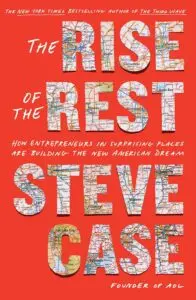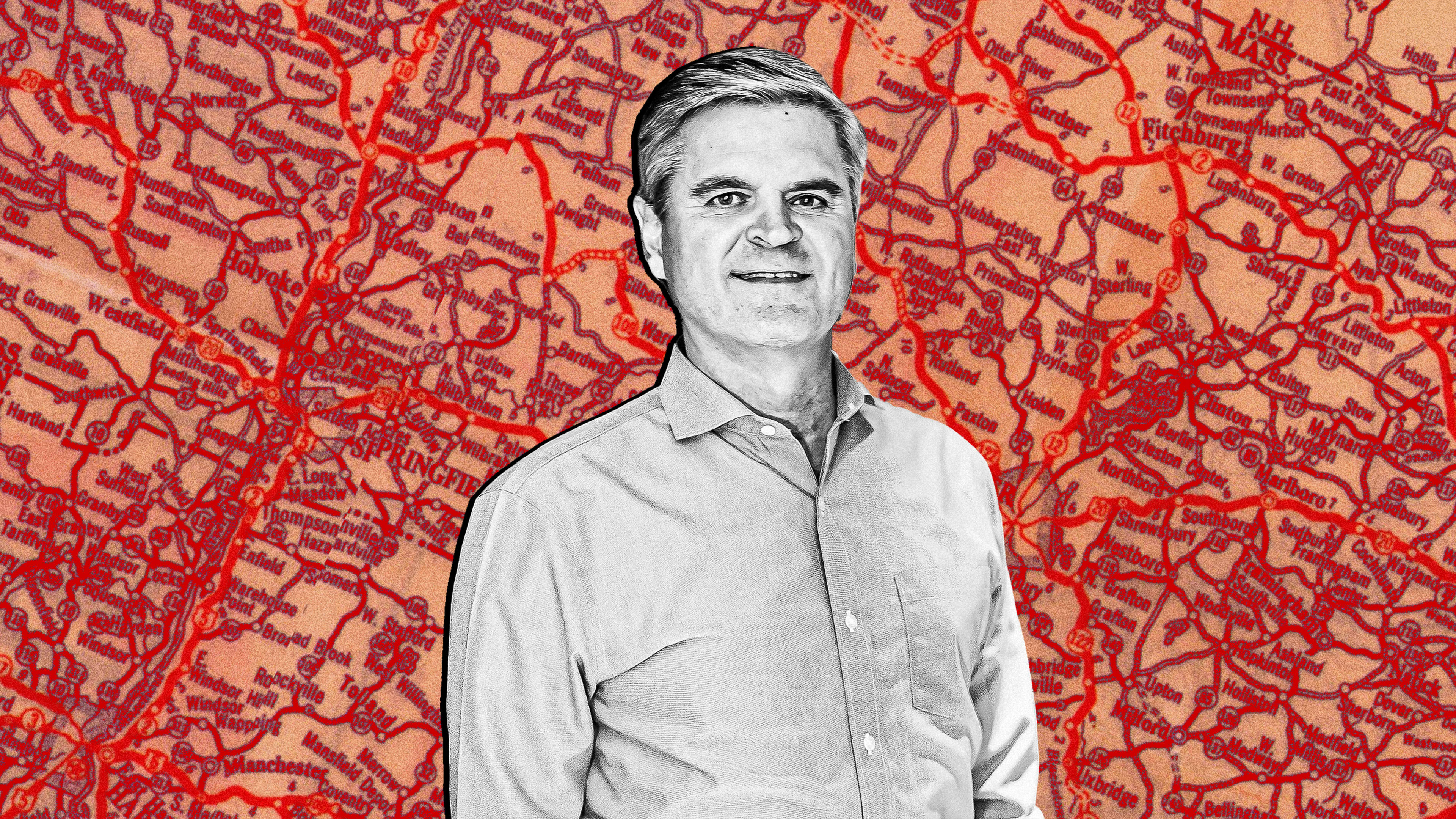If you were on the internet in the 1990s, chances are that you paid a company called America Online, better known as AOL, for the privilege. The man who was largely responsible for introducing America to the internet was Steve Case, who cofounded AOL in Vienna, Virginia, and served as its CEO until 2001, when it merged with Time Warner.

The fact that America’s first major gateway to the internet came out of Northern Virginia and not Silicon Valley seems to be a chip that Case still carries on his shoulder. Since he founded the D.C.-based venture firm Revolution in 2005, he’s been a prominent advocate for tech startups in America’s heartland, investing in entrepreneurs outside of the traditional tech hubs in California, New York, and Massachusetts.
His new book, The Rise of the Rest, borrows its name from the seed stage fund Revolution established in 2014 and the bus tour that followed, with Case and his team traveling around the country in search of startups to invest in. The book tells the stories of some of those startups and attempts to outline a theory of what founders in these regions need to succeed.
After nearly two decades of pushing for better access to resources for entrepreneurs in overlooked parts of the country, it seems as if the tide might be turning in Case’s direction. A report published by Revolution and Pitchbook found that in the last decade, more than 1,400 new venture firms have sprung up outside the typical tech hubs, and in 2021, for the first time in more than a decade, California received less than 30% of early-stage VC dollars invested in the country.
Fast Company spoke with Case about how the pandemic accelerated these trends, and why he believes the coming decade will see more tech innovation from unexpected parts of the country.
This interview has been edited for length and clarity.
Fast Company: In this post-pandemic, remote work world, how much does place matter?
Steve Case: I think place still does matter. A silver lining to the pandemic was that we unbundled work and life. A lot of people are taking a step back and reassessing how they want to work and where they want to live.
Before, if you wanted to be in the innovation economy, it felt like you had to be in Silicon Valley or New York or Boston. It wasn’t practical in a lot of other parts of the country, because you wouldn’t have access to venture capital or to a lot of people with experience starting or scaling companies in those parts of the country.
Over the last two years, though, we’ve seen the first phase of talent dispersion: people deciding to move someplace else while working for their existing company. What we’re starting to see now in the next phase—and it’s still early—is that once these people are dispersed around the country, some of them will continue to work remotely for that company on the coast, but a lot of them will see what’s happening in the local startup community and consider either joining one of those companies or starting their own.
Of all the places in the country that you’ve visited so far, what have you found to be the most exciting areas for startup formation?
Well, part of the reason I wrote the book is that it’s really not just a few cities, it’s a few dozen. We profiled 29 different cities in the book, visited 44 with our bus tours, and eventually invested in 100. So this is a broadly dispersed phenomenon.
In these cities, one of the motivations for talent migration and startup formation is the lower cost of living and operating, and that the money raised can go a lot further. Another important driver is that people decide to move to a particular city for either personal, family, or lifestyle reasons.
But to me the most important factor is that entrepreneurs are recognizing that different parts of the country have interesting strategic advantages—the sort of legacy companies that exist in their region, or the specialized expertise of particular universities that they are able to leverage.
In Atlanta, for example, the startup Hermeus is building Mach 5 engines and really tapping into the fact that Atlanta is an aerospace hub, but also Georgia Tech has considerable expertise in that particular space.
In Chattanooga, Tennessee, there’s FreightWaves, which is building a data platform for the trucking and logistics industry. Some of the biggest trucking companies in the country are headquartered in Chattanooga. So if you’re building Bloomberg for trucking, better to be in Chattanooga than in Manhattan.
That’s what gives me confidence that this has legs. This shift in the dispersion of talent and the dispersion of capital is slowing the brain drain of people leaving these cities, and creating a boomerang effect with people returning to these cities. Plus, entrepreneurs all around the country are using Zoom and other technologies to make pitches to coastal venture capitalists who weren’t as accessible to them before.
What are the critical factors to create a startup ecosystem?
There are a number of ingredients that are important, but what really creates the magic is when they converge. First, the talent aspect is critical. How do cities ensure that they are magnets for talent? Cities have historically competed to attract companies. Now they’re competing for people to move there.
Capital is another key factor. In Silicon Valley, entrepreneurs often start with a “friends and family” round. But it’s much harder to pull together the friends and family round for entrepreneurs in most other parts of the country. So creating ways to get those entrepreneurs the initial capital they need is crucial.
Another important aspect is collaboration: The startup infrastructure that’s starting to be built out in some of these cities requires getting people involved not only from startups themselves, but from the university, the government, and the big companies in town.
Finally, there’s culture: One of the great things about Silicon Valley is that they tend to focus on the big idea and the possibility. A lot of other communities in the country are more cautious, risk averse, and status-quo oriented, so changing that culture is also important.
What role do you see policymakers playing in helping these startups get to their feet and stay supported?
I think there is an important role for government. Some of it is just creating an environment that’s conducive to startup creation and capital formation, which is still something the United States is a global leader in. One thing that’s encouraging at the national level is the funding and legislation included in the CHIPS Act—in Columbus, Intel made a big announcement a couple of weeks ago with President Biden on starting construction of a new plant. Intel played a role in building Silicon Valley and now they want to help build “Silicon Heartland.”
It’s not just semiconductors—there was significant funding authorized to build regional tech hubs. One of the reasons that Silicon Valley has been successful was some of the funding that the government provided half a century ago to invest in core technologies that led to semiconductors and computers and so forth.
At the local level, there is more focus from local and state governments on entrepreneurs, not just the big Fortune 500 companies. A lot of mayors are recognizing that rather than trying to lure a big company, a more sustainable strategy is to help launch more new companies, some of which will end up someday being big companies.
How do you see this playing out over the next decade?
The next decade will be about backing entrepreneurs everywhere. That’s not to say Silicon Valley won’t still have the lead, but you won’t have to be there to participate in the innovation economy. And because of how important startups are to job creation, having more of these companies started in more places means more jobs, hope, and opportunity are being distributed across more of the country.
I think that bodes well for helping our divided nation come together a little bit more than it has so far. And it’s our best way to make the most of America, which remains the most innovative and entrepreneurial nation. So I’m bullish.
Kaushik Viswanath is a writer and editor based in New York City.
Recognize your brand’s excellence by applying to this year’s Brands That Matter Awards before the early-rate deadline, May 3.
